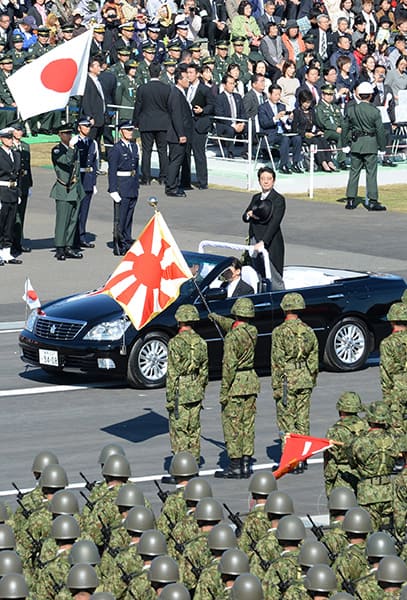Media Smear Shinzo Abe
Gregory Hood, American Renaissance, July 13, 2022
Prime Minister Shinzo Abe was the longest-serving prime minister in Japanese history. That may be the very definition of “mainstream.” However, English-language media had scathing remarks about Abe, which was especially striking because an assassin had just shot him dead.
The subheading of the AP’s report reads: “Shinzo Abe, a divisive archconservative who was Japan’s longest-serving prime minister and remained a powerful and influential politician after leaving office, has died . . . .”
NPR also tweeted that Mr. Abe was a “divisive archconservative.” It deleted that tweet and shifted to calling him an “ultranationalist” instead.
Shinzo Abe, the former Japanese prime minister and ultranationalist, was killed at a campaign rally on Friday.
Police tackled and arrested the suspected gunman at the scene of an attack that shocked many in Japan. https://t.co/YpyEIM2Cim
— NPR (@NPR) July 8, 2022
NBC called him “divisive but dominant.” It also couldn’t tell the difference between the flags of Japan and South Korea, not exactly two marginal countries.
Ummmm, wrong country, @TODAYshow.@NBCNews, your morning show has some issues with keeping the countries in Asia straight. pic.twitter.com/0UngDDpVb3
— Curtis Houck (@CurtisHouck) July 8, 2022
The Washington Post said he left a “divided legacy:” “Abe, who was assassinated Friday, angered both liberals at home and World War II victims in Asia with his hawkish push to revamp the military and his revisionist view that Japan was given an unfair verdict by history for its brutal past.”
This, it seems, made him “extreme.” Abe also visited the Yasukuni Shire, which commemorates all 2.5 million of Japan’s war dead. Among them is Hideki Tojo, the Japanese wartime prime minister, as well as 13 other “Class A” war criminals from World War II. Prime Minister Abe wanted Japan to have a real military instead of just the “Self-Defense Force” and to become a “normal” country.

Oct. 27, 2013 – Prime Minister Shinzo Abe inspects troops during a military review at the Japan Ground Self-Defense Force’s Asaka training ground near Tokyo. Around 4000 personnel, 240 military vehicles and 50 aircrafts took part in the inspection parade. (Credit Image: © Ma Ping/Xinhua/ZUMAPRESS.com)
Abe argued that Japanese must not be saddled with guilt. “We must not let our children, grandchildren, and even further generations to come, who have nothing to do with that war, be predestined to apologize,” he said.
This is very different from Germany. “Any celebration of anything German must tempered with apologies for Hitler,” wrote Paul Gottfried of Germany’s “civic patriotism.” It’s also different from most of the West, where even the victorious Allied nations must now include themselves in denunciations of nationalism, fascism, and imperialism. The Washington Post wrote that America should be treated like Germany, a conquered nation, and be taught the proper mentality of apology.
An exception is Russia, where the Kremlin evokes the “Great Patriotic War” to promote patriotism, and, arguably, Russian revanchism. Foreign Policy said Russia was using “an archaic revisionist view of the world through flawed historical narratives.” Russia’s refusal to accept war guilt means it can use World War II to promote pride rather than shame. This may be morally and historically questionable, but politically wise. A people free of guilt is a healthy people. Modern Western populations are not.
In Ukraine today, the need to promote a national identity separate from Russia has led to the celebration of leaders and military units that fought with the Third Reich against Soviet domination. The Biden Administration, social media, and journalists — usually eager to exaggerate “far-right” threats — support the Kyiv regime by downplaying groups such as the Azov Battalion.
Why doesn’t Japan get the same support? American policymakers want Japanese remilitarization, or at least preparedness, in response to threats from China. China had to restrain its citizens from rejoicing at Abe’s death. American media did not go that far, but it hardly celebrated the former prime minister’s accomplishments.
The Japanese committed many acts of brutality and cruelty during the war, but the reaction to Prime Minister Abe’s death shows that refusing to accept perpetual guilt makes a politician “divisive,” despite a long and successful career. All it takes to be an “extremist” is to take pride in your culture and identity.
I do not mean to excuse anything the Japanese or anyone else did in World War II. However, if a group is supposed to be held collectively guilty for ever for the crimes of the past, it should also be able to claim its historical victories and achievements with pride. That is true for whites as well as the Japanese.















